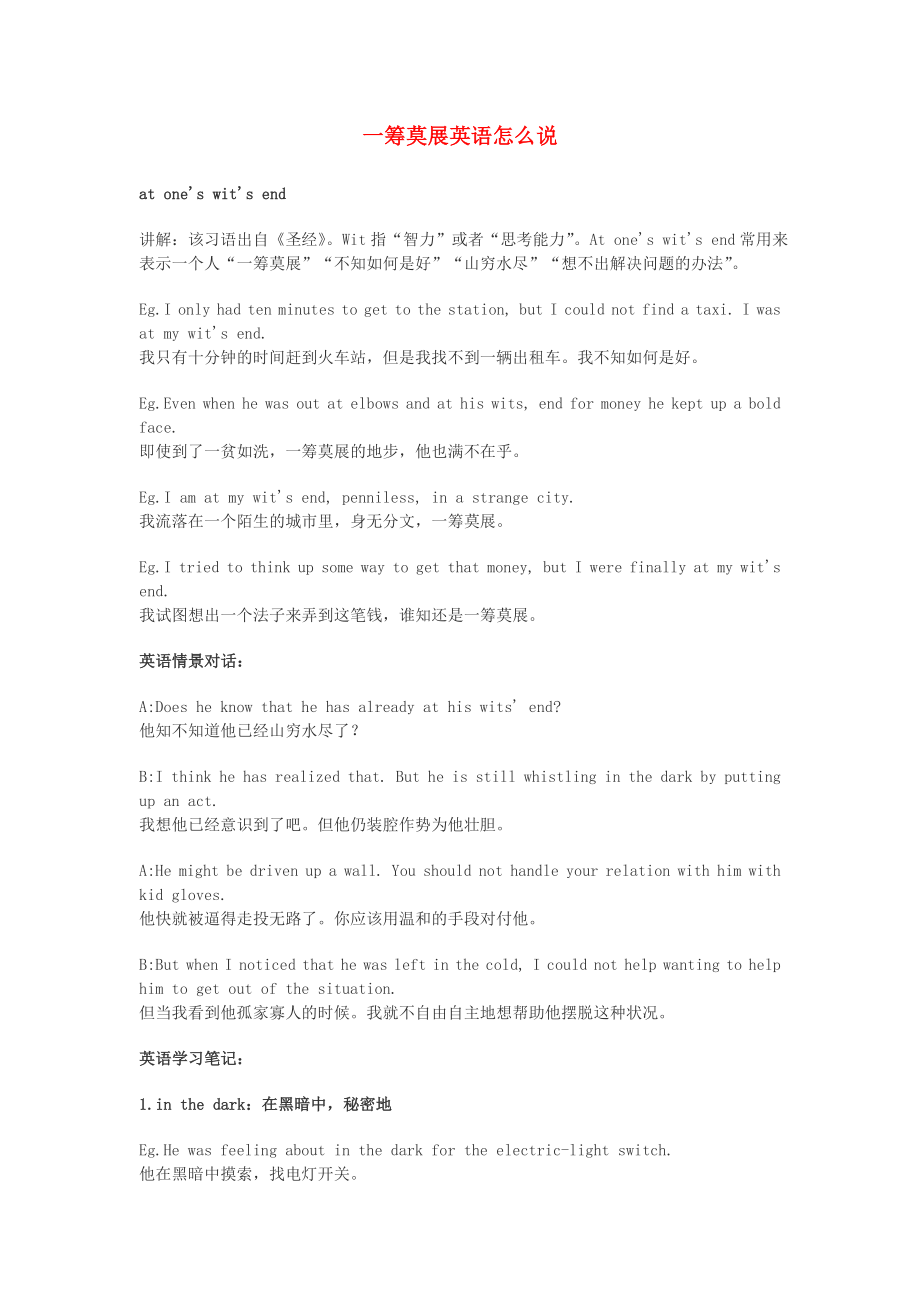《2015年高中英語俚語習(xí)語小對(duì)話 第46期 一籌莫展英語怎么說素材》由會(huì)員分享��,可在線閱讀�,更多相關(guān)《2015年高中英語俚語習(xí)語小對(duì)話 第46期 一籌莫展英語怎么說素材(3頁珍藏版)》請(qǐng)?jiān)谘b配圖網(wǎng)上搜索���。
1�����、一籌莫展英語怎么說
at one's wit's end
講解:該習(xí)語出自《圣經(jīng)》。Wit指“智力”或者“思考能力”����。At one's wit's end常用來表示一個(gè)人“一籌莫展”“不知如何是好”“山窮水盡”“想不出解決問題的辦法”�����。
Eg.I only had ten minutes to get to the station, but I could not find a taxi. I was at my wit's end.
我只有十分鐘的時(shí)間趕到火車站����,但是我找不到一輛出租車����。我不知如何是好。
Eg.Even when he was out at elbows and a
2��、t his wits, end for money he kept up a bold face.
即使到了一貧如洗���,一籌莫展的地步����,他也滿不在乎�。
Eg.I am at my wit's end, penniless, in a strange city.
我流落在一個(gè)陌生的城市里,身無分文�,一籌莫展。
Eg.I tried to think up some way to get that money, but I were finally at my wit's end.
我試圖想出一個(gè)法子來弄到這筆錢���,誰知還是一籌莫展�����。
英語情景對(duì)話:
A:Does he know tha
3���、t he has already at his wits' end?
他知不知道他已經(jīng)山窮水盡了��?
B:I think he has realized that. But he is still whistling in the dark by putting up an act.
我想他已經(jīng)意識(shí)到了吧����。但他仍裝腔作勢(shì)為他壯膽�。
A:He might be driven up a wall. You should not handle your relation with him with kid gloves.
他快就被逼得走投無路了。你應(yīng)該用溫和的手段對(duì)付他��。
B:But wh
4�����、en I noticed that he was left in the cold, I could not help wanting to help him to get out of the situation.
但當(dāng)我看到他孤家寡人的時(shí)候���。我就不自由自主地想幫助他擺脫這種狀況����。
英語學(xué)習(xí)筆記:
1.in the dark:在黑暗中��,秘密地
Eg.He was feeling about in the dark for the electric-light switch.
他在黑暗中摸索�,找電燈開關(guān)。
Eg.It's a wonder (that)you didn't lose
5���、 your way in the dark.
令人驚奇的是你在黑暗中竟未迷路���。
Eg.Hawthorne, by comparison, worked in the dark.
霍桑相形之下是默默無聞地工作的。
Eg.We were kept completely in the dark about his plan to sell the company.
對(duì)他計(jì)劃將公司出售一事, 我們一直蒙在鼓里���。
2.drive sb up a wall:使某人走投無路����,使某人受不了���,促使一個(gè)人非常緊張���、難受或者是使他很煩燥
Eg. People like that just drive
6、me up a wall!
那種人真是讓人受不了�。
Eg. That guy in the next apartment has been playing his trumpet for four solid hours now and it's driving me up the wall! I' about ready to go next door and tell him to stop all the noise.
隔壁那套房間里的人吹喇叭已經(jīng)吹了整整四個(gè)小時(shí)了。這簡(jiǎn)直快把我逼瘋了����。我真是要跑到他那里去����,叫他不要再吹了�����。
Eg.Mary and I have been fri
7����、ends more than ten years. She's very nice and I like her a lot. But she likes to criticize me whenever I wear a new suit. It drives me up the wall every time she does it.
瑪麗跟我交朋友已經(jīng)有十多年了。她是一個(gè)很好的人����;我也非常喜歡她。但是��,我一穿新西裝�����,她總是喜歡批評(píng)我����。每次她挑剔我衣服的時(shí)候�����,我真是非常惱火�。
3.with kid gloves:巧妙地, 溫和地, 委婉地
4.handle with kid glov
8����、es:小心應(yīng)付
Eg.He gets angry ever easily; you must handle him with kid gloves.
他動(dòng)輒發(fā)脾氣����,你要小心地對(duì)付他。
Eg.We must treat the whole situation with kid gloves.
我們必須謹(jǐn)慎處理整個(gè)形勢(shì)��。
Eg.Such overly sensitive people must is handled with kid gloves.
對(duì)這種過分小心眼兒的人必須妥善應(yīng)付����。
Eg.Mary is easily distressed. You'll have to hand
9、le her with kid gloves.
瑪麗動(dòng)不動(dòng)就傷心�,你對(duì)待她得溫和謹(jǐn)慎些。
leave sb in the cold:冷淡對(duì)待某人�,對(duì)人冷酷無情,不理睬某人����,冷落某人
Eg. Every time I see you, you leave me in the cold.
每次我見到你���,你都不睬我。
5.cannot help doing something:禁不住做某事��,忍不住做某事
Eg.He cannot help feeling considerable qualms about it.
他仍然不禁對(duì)它感到疑慮重重��。
Eg.Whenever I hear t
10�、he story, I cannot help crying.
每次我聽這故事,就忍不住要哭�����。
Eg.I cannot help worrying to hear that there is no steamer this week.
我聽到本周沒有船的消息��,禁不住擔(dān)憂起來�。
6.get out of:逃避, 戒除, 由 ... 出來
Eg.She'll need luck to get out of a tight corner like that.
她要靠運(yùn)氣才能擺脫那樣的困境。
Eg.I can't get out of the habit of waking at six in the morning.
我早上一到六點(diǎn)就醒����,這習(xí)慣改不掉了。
Eg.I wish I could get out of the habit of smoking.
我希望我能改掉吸煙的習(xí)慣�。
 2015年高中英語俚語習(xí)語小對(duì)話 第46期 一籌莫展英語怎么說素材
2015年高中英語俚語習(xí)語小對(duì)話 第46期 一籌莫展英語怎么說素材

